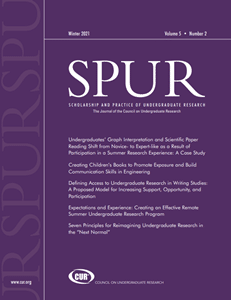SPUR (2021) 5 (2): https://doi.org/10.18833/spur/5/2/4
The COVID-19 pandemic and the migration to online learning have presented unique challenges to undergraduate research, reducing opportunities to participate in highimpact practices, including in-person summer research programs. To mitigate some of these effects, Loyola Marymount University adapted its summer undergraduate research program, traditionally held as a six-week program on campus, to a remote structure. This article describes methods for migrating an existing program online and utilizes a mixed-methods approach to analyze student satisfaction and self-perceived changes in transferable knowledge and life skills and confidence in research ability. The data supported the hypothesis that a virtual summer research program can provide meaningful student research experiences, supportive relationships with faculty mentors, and an increase in students’ desire to pursue research opportunities in the future.
More Articles in this Issue
No posts found


